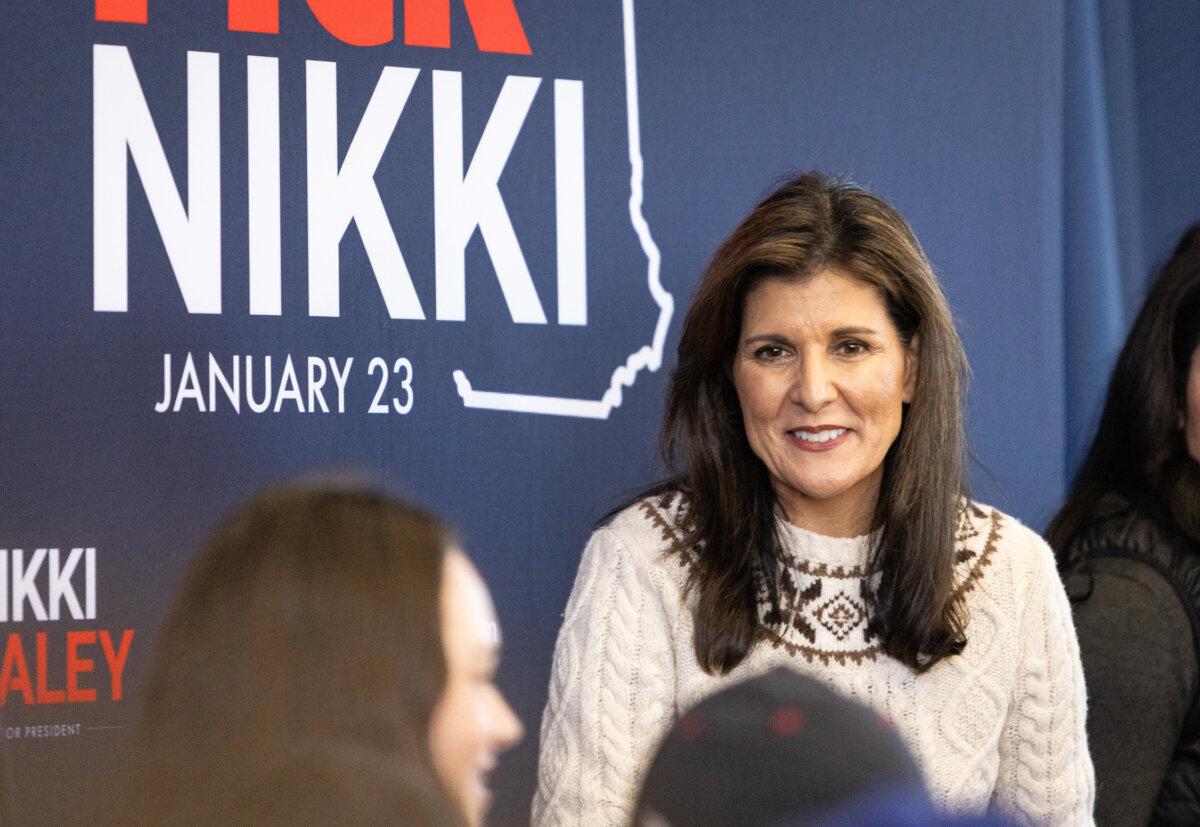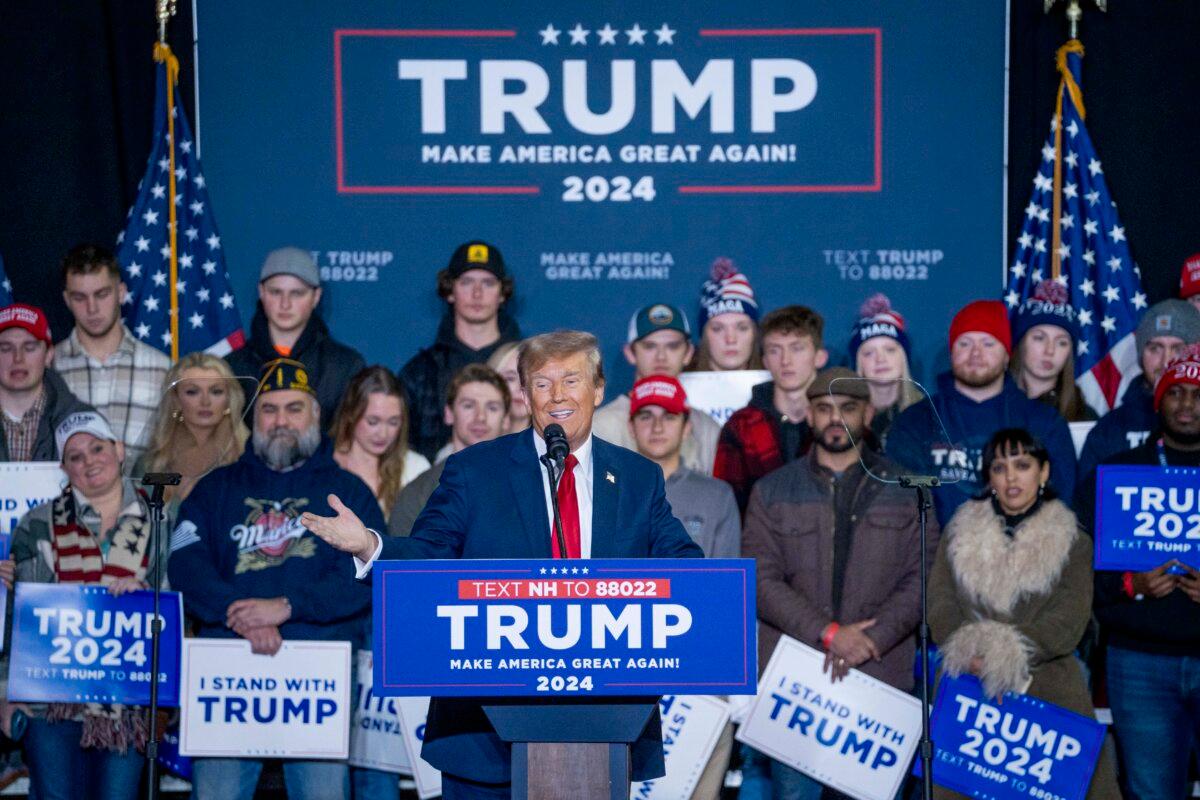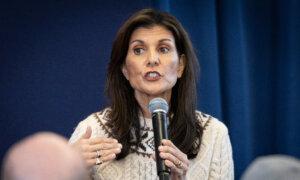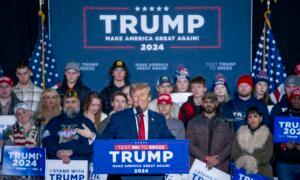With Gov. Ron DeSantis out of the Republican presidential race, Nikki Haley has the opportunity to prove she can compete directly with Donald Trump—or not.
CONCORD, N.H.—Nikki Haley now faces a head-to-head contest with President Donald Trump in New Hampshire’s Republican primary after Florida Gov. Ron DeSantis’s exit from the race.
The Jan. 23 contest promises to be a critical test of Ms. Haley’s ability to challenge President Trump’s dominance in the race for the presidential nomination.
“It’s now one fella and one lady left,“ Haley told supporters on Jan. 21, speaking of President Trump and herself. ”There were 14 people in this race,” she continued. “All the fellas are out except for this one. And this comes down to what do you want? Do you want more of the same or do you want something new?”
Shifting Momentum
Ms. Haley enjoyed a surge in New Hampshire polls beginning in late December, though that seems to have softened recently.
A Jan. 15 poll by American Research Group, Inc., showed President Trump and Ms. Haley tied at 40 percent each. Other polls have shown President Trump leading by a double-digit margin.
The most recent polling, released Jan. 21 by CNN and the University of New Hampshire, showed Mr. Trump leading Ms. Haley by 11 percentage points.
That poll also indicated that 62 percent of likely Republican voters in New Hampshire who named Mr. DeSantis as their first-choice candidate listed Mr. Trump as their second choice. Some 30 percent indicated that Ms. Haley was their second choice.
Mr. DeSantis, who was polling at 6 percent, has endorsed President Trump.
The changing dynamics of the race have caused the Haley campaign to dampen expectations concerning the primary election result.
New Hampshire Gov Chris Sununu, who has campaigned aggressively for Ms. Haley, predicted in December that she would win the race outright.
“It’s an absolute win,” Mr. Sununu said in an ABC News interview on Dec. 17. “She’s going to win in a landslide,” he added.
Mr. Sununu amended that prediction in an interview on “Nightline” on Jan. 17, saying that a strong second-place finish was the goal.
“That’s the only expectation we ever laid out there,” he said. “Now to the fact that she’s challenging him to actually win the state, something no one in the media ever thought was possible, that gets everybody really excited.”
“I mean, that’s a pretty big hill to climb, to be sure, but it can be done,” he added.
The Matchup
President Trump and Ms. Haley have tried to define the election by defining each other.

President Trump has portrayed his opponent as a political lightweight and closet liberal who is aligned with Democratic priorities.
“She is not presidential timber,” President Trump said of Ms. Haley on Jan. 19. “She’s not tough enough. She’s not smart enough,” he added. “She cannot do this job.”
On matters of policy, President Trump portrays Ms. Haley as more in touch with global elites than with everyday Americans.
“Nikki Haley is the candidate of the globalists and Democrats who will do everything to stop the America First movement. From higher taxes, to decimating Social Security and Medicare, and to open borders, she represents the views of Democrats more than the views of Republicans,” President Trump said in a Jan 21 statement.
Mr. DeSantis fed that narrative when shifting his support to President Trump. “He has my endorsement because we cannot go back to the old Republican guard of yesteryear,” Mr. DeSantis said. “A repackaged form of warmed-over corporatism that Nikki Haley represents.”
Ms. Haley has pictured President Trump as too old and effective as a leader to be president.
“The majority of Americans think that having two 80-year-olds running for president is not what they want,” Ms. Haley told New Hampshire voters at a recent campaign stop. Ms. Haley is 52. President Trump is 77 and President Biden is 81.
Ms. Haley also has questioned the former president’s mental competency.
“When you see them hit a certain age, there is a decline. That’s a fact. Ask any doctor,” Ms. Haley said on Jan. 20, seeming to refer to comments made by President Trump on Jan. 19. Mr. Trump apparently referred to Ms. Haley multiple times when meaning to mention Nancy Pelosi in connection with the events of Jan. 6.
Ms. Haley’s most consistent criticism of President Trump is that he proved to be an ineffective leader who plunged the country into chaos.
“What a leader does is they bring out the best in people and get them to see the way forward,” Ms. Haley said in a televised presidential debate on Jan. 10. “That’s what we need in our country. We don’t need this chaos anymore.”
“We can’t go through four more years of chaos,” Ms. Haley later added. “And if it’s Donald Trump, there will be four more years of chaos.”

Perhaps the most significant distinction between the two is the language they use to describe their vision for America. While the two have similar policy positions on matters such as securing the southern border, President Trump often speaks of “America first” while Ms. Haley refers to a “strong America” or American strength.
That distinction plays out in policy matters such as support for Ukraine in its war against Russia.
Ms. Haley is an outspoken advocate of continued aid for Ukraine as well as Israel, and for meeting foreign aggression with military strength as the way to preserve peace.
President Trump has cautioned against American involvement in a European war, preferring to put more resources into securing the U.S. border with Mexico rather than the Ukraine border with Russia.
The Stakes
When Mr. DeSantis withdrew from the race, he said, “It’s clear to me that a majority of Republican primary voters want to give Donald Trump another chance.”
Though he seemed capable of competing with Ms. Haley, the governor recognized that he was unable to close the 30 percentage-point gap between himself and President Trump. That realization underscores the challenge facing Ms. Haley.
Here, she is polling within sight of the former president. Nationally, the situation is different. President Trump is running 54 percentage points ahead of Ms. Haley in national polls. In her home state of South Carolina, the next to hold a primary, the gap is 36 points.
President Trump has upped the stakes in both states by brining a delegation of Palmetto State Republicans to campaign for him here. The group included Gov. Henry McMaster and Lt. Gov. Pamela Evette, who spoke on behalf of the former president at a Jan. 21 rally in Manchester.
Sen. Tim Scott, a South Carolina Republican, had endorsed President Trump the previous day.
A strong showing in New Hampshire might argue that Ms. Haley is capable of challenging President Trump directly. A poor result here could question her ability to compete even in her home state.
Capping her remarks on Jan. 21 on the “lady” and “fella” still in the race, Ms. Haley said, “May the best woman win.”
President Trump concluded his statement on the state of the race by making this appeal to New Hampshirites: “It’s time to choose wisely.”
The first-in-the-nation New Hampshire primary election will be held on Jan. 23.
Original News Source Link – Epoch Times
Running For Office? Conservative Campaign Consulting – Election Day Strategies!


